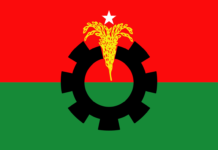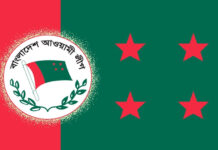Tripods are seen without cameras and their operators in front of the BNP Nayapaltan headquarters yesterday. Newspersons usually wait there to get opposition leaders’ comments as they emerge out of the office. But with almost 50 of its active leaders behind bars, there was no opposition leader yesterday to speak to the media for quite a while. The BNP is finding it difficult to even hold press conferences on schedule.Photo: SK Enamul Haq
The crackdown on main opposition BNP has plunged the party into a temporary leadership crisis, as more than its 50 central leaders, including the acting secretary general, are now in jail.
The situation has put the opposition in a quandary. Many of its activists are confused about the fate of the ongoing anti-government agitation, as almost all the leaders active on the street have been put behind bars in less than a month.
Against such backdrop, BNP has asked its young leaders to stay safe from arrests, said party’s senior leader Khandaker Mosharraf Hossain yesterday.
He said his party would step up the ongoing agitation and the legal battle to free their detained leaders.
Talking to The Daily Star yesterday, some political analysts and opposition leaders observed that the crackdown would not yield positive result; rather deteriorate the situation further by closing the window for resolving the crisis through talks.
On Sunday, eight senior BNP leaders, including its acting secretary general Mirza Fakhrul Islam Alamgir who had earlier been put behind bars twice in less than a year, were denied bail and sent to jail. They have been charged with torching vehicles and assaulting police during opposition’s agitation.
The party’s standing committee members Moudud Ahmed, Mirza Abbas and Goyeshwar Chandra Roy; its Vice-Chairman Abdullah Al Noman; MPs Barkatullah Bulu and Shahiduddin Chowdhury Anee; and its youth front Juba Dal chief Moazzem Hossain Alal also landed in jail along with Fakhrul.
Chances of their coming out soon is lean, as a Dhaka court yesterday fixed April 21 to hear the bail petition filed by the defendants.
On March 11, a total of 148 BNP leaders, including opposition Chief Whip Zainul Abdin Farroque, joint secretary generals Rizvi Ahmed and Amanullah Aman, had been detained in two cases in connection with vandalising vehicles and assaulting police. They have also been denied bail twice.
On Sunday night, law enforcers detained another BNP Joint Secretary General Salahuddin Ahmed, who had been speaking against the government and announcing the party’s agitation programmes in absence of Fakhrul.
“The party is facing a temporary leadership vacuum,” said Khandaker Mosharraf, adding that the government had made the political situation worse by launching the crackdown.
Meanwhile, Home Minister Mohiuddin Khan Alamgir claimed that those who had been put behind bars were facing specific charges of arson, homemade bomb blasts and vandalism.
State Minister for law Qamrul Islam, however, alleged the senior leaders of BNP of conspiring to destabilise the state organs.
On sending the eight BNP senior leaders to jail on Sunday, State Minister for home Shamsul Haque Tuku said there were specific allegations against them and it was the court that had sent them to jail. The government had nothing to do with this, he claimed.
Immediately after the bail denial, counsel for the defendants Mahbubuddin Khokon alleged that the lower court had acted in line with government directives.
Analysing the situation, two former advisers to the caretaker government strongly denounced the way the government has been treating the opposition.
“The government actions will only broaden the gap between the major political parties, said Akbar Ali Khan.
“The government’s attitude is tantamount to gagging democracy. This culture will push democracy towards its death,” said M Hafizuddin Khan, adding that the trend of paralysing the opposition would invite dire consequences.
A ruling-Awami League leader, on condition of anonymity, said he personally did not support the way the government had been behaving with the opposition leaders.
Source: The Daily Star










